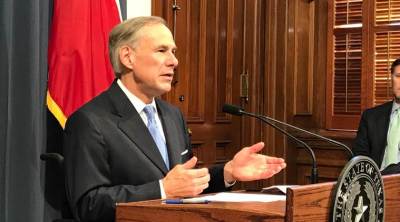Texas creates ‘1836 Project’ to teach ‘patriotic education,’ ‘Christian heritage’

Texas has passed a law creating an “1836 Project” aimed at promoting values considered fundamental to state identity, as well as the launching of an advisory committee aimed at promoting “patriotic education.”
Gov. Greg Abbott signed HB 2497 earlier this week, saying in a statement posted to Twitter that “we must never forget why Texas became so exceptional in the first place.”
“The 1836 Project promotes patriotic education about Texas and ensures that the generations to come understand Texas values,” said Abbott. “Every newcomer to Texas who gets a driver’s license will also get a pamphlet that outlines Texas’ rich history.”
“The law also establishes the Gubernatorial 1836 Award to recognize students’ knowledge of the founding documents about Texas history.”
Lucy Meckler, campaign manager for the Next Generation Texas initiative of the Texas Public Policy Foundation, told The Christian Post that she supported the new law, calling it "a unique and robust way to educate Texans on our state’s founding principles, rich history, and diverse culture."
"[The 1836 Project ensures] that all voices have the ability to participate in the creation and dispersing of Texas history and civics education to the public," Meckler said.
"At a time when our state is struggling with a civic literacy crisis and growing rapidly in population, it is more important than ever to ensure that every Texan has the opportunity to learn about what makes this state so great."
According to the law, the advisory committee will have nine members who are “reflective of the diversity of the state,” with the governor, lieutenant governor, and speaker of the House each picking three people to serve a two-year term.
Topics that the project is expected to promote under Texas history will include: “the indigenous peoples of this state, the Spanish and Mexican heritage of this state, Tejanos, the African American heritage of this state, the Texas War for Independence, Juneteenth, annexation of Texas by the United States, the Christian heritage of this state, and this state’s heritage of keeping and bearing firearms in defense of life and liberty and for use in hunting.”

Critics of the Texas law include Valerie Street, president of the Texas Progressive Action Network, who told CP that she considered it “an unnecessary piece of legislation.”
“Texas state history is already part of public school curriculum,” she said. “We agree wholeheartedly with the need for Texas students to be given opportunities to deepen their knowledge of history.”
“Our hope, however, is that the history we provide in our schools be full, accurate and whole and we share concerns that our state is still struggling to overcome a tendency toward the whitewashing of that history and a failure to bring in the lesser-heard, lesser-known perspectives that are just as integral a part of our story.”
Regarding the criticism of the 1836 Project, Meckler told CP that the law "does not gloss over Texas’ unique history but instead embraces it."
"In addition, the bill specifically mentions that 'The 1836 Project is composed of nine members reflective of the diversity of the state,' ensuring that all voices have the ability to participate in the creation and dispersing of Texas history and civics education to the public," Meckler said.
The name alludes to “The 1619 Project,” a New York Times Magazine series of essays arguing that slavery continues to influence the United States in various ways.
While many pundits and scholars have critiqued the 1619 Project for its historic inaccuracies, it nevertheless has been featured in the curricula of some public school districts throughout the country.
Nikole Hannah-Jones, the reporter who headed the project, said in a series of Twitter posts last year that it was “not a history” but rather a challenge to “the national narrative.”
“The crazy thing is, the 1619 Project is using history and reporting to make an argument. It never pretended to be a history,” she tweeted at the time. “We explicitly state our aims and produced a series of essays. Critique was always expected, but the need to discredit it speaks to something else.”
On Wednesday, The Washinton Times reported that the U.S. Department of Education has been "inundated" with over 35,000 complaints in response to the Biden administration's plan to urge K-12 schools to teach the 1619 Project and critical race theory.





























